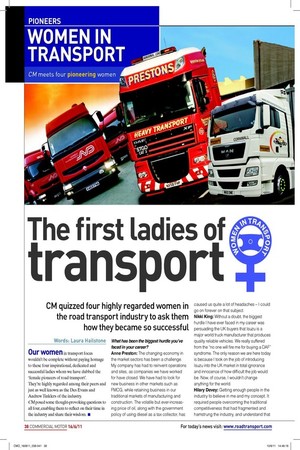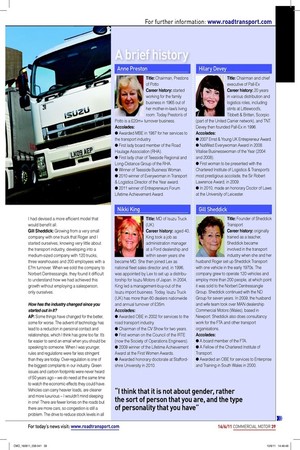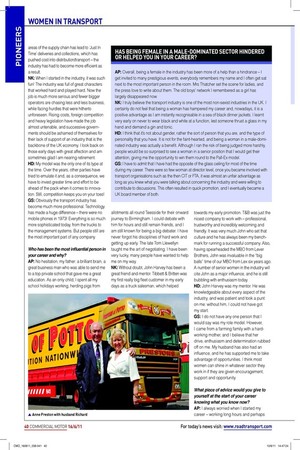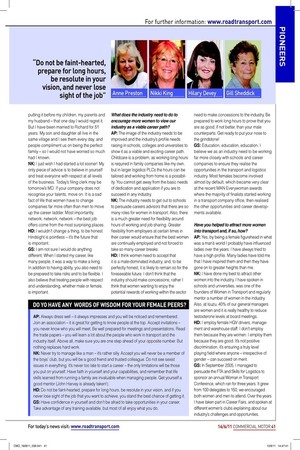The first ladies of
Page 33

Page 34

Page 35

Page 36

If you've noticed an error in this article please click here to report it so we can fix it.
transport
CM quizzed four highly regarded women in the road transport industry to ask them how they became so successful
Words: Laura Hailstone Our women in transport focus wouldn’t be complete without paying homage to these four inspirational, dedicated and successful ladies whom we have dubbed the ‘female pioneers of road transport’ .
They’re highly regarded among their peers and just as well known as the Des Evans and Andrew Tinklers of the industry.
CM posed some thought-provoking questions to all four, enabling them to relect on their time in the industry and share their wisdom. ■
What has been the biggest hurdle you’ve faced in your career?
Anne Preston: The changing economy in the market sectors has been a challenge. My company has had to reinvent operations and sites, as companies we have worked for have closed. We have had to look for new business in other markets such as FMCG, while retaining business in our traditional markets of manufacturing and construction. The volatile but ever-increasing price of oil, along with the government policy of using diesel as a tax collector, has caused us quite a lot of headaches – I could go on forever on that subject.
Nikki King: Without a doubt, the biggest hurdle I have ever faced in my career was persuading the UK buyers that Isuzu is a major world truck manufacturer that produces quality reliable vehicles. We really suffered from the “no one will fire me for buying a DAF” syndrome. The only reason we are here today is because I took on the job of introducing Isuzu into the UK market in total ignorance and innocence of how difficult the job would be. Now, of course, I wouldn’t change anything for the world.
Hilary Devey: Getting enough people in the industry to believe in me and my concept. It required people overcoming the traditional competitiveness that had fragmented and hamstrung the industry, and understand that I had devised a more efficient model that would benefit all.
Gill Sheddick: Growing from a very small company with one truck that Roger and I started ourselves, knowing very little about the transport industry, developing into a medium-sized company with 120 trucks, three warehouses and 200 employees with a £7m turnover. When we sold the company to Norbert Dentressangle, they found it difficult to understand how we had achieved this growth without employing a salesperson, only ourselves.
How has the industry changed since you started out in it?
AP: Some things have changed for the better, some for worse. The advent of technology has lead to a reduction in personal contact and relationships, which I think has gone too far. It’s far easier to send an email when you should be speaking to someone. When I was younger, rules and regulations were far less stringent than they are today. Over-regulation is one of the biggest complaints in our industry. Green issues and carbon footprints were never heard of 50 years ago – we do need at the same time to watch the economic effects they could have. Vehicles can carry heavier loads, are cleaner and more luxurious – I wouldn’t mind sleeping in one! There are fewer lorries on the roads but there are more cars, so congestion is still a problem. The drive to reduce stock levels in all areas of the supply chain has lead to ‘Just In Time’ deliveries and collections, which has pushed cost into distribution/transport – the industry has had to become more efficient as a result.
NK: When I started in the industry, it was such fun! The industry was full of great characters that worked hard and played hard. Now the job is much more serious and fewer bigger operators are chasing less and less business, while facing hurdles that were hitherto unforeseen. Rising costs, foreign competition and heavy legislation have made the job almost untenable, and successive governments should be ashamed of themselves for their lack of support of an industry that is the backbone of the UK economy. I look back on those early days with great affection and am sometimes glad I am nearing retirement. HD: My model was the only one of its type at the time. Over the years, other parties have tried to emulate it and, as a consequence, we have to invest greater time and effort to be ahead of the pack when it comes to innovation. Still, competition keeps you on your toes! GS: Obviously the transport industry has become much more professional. Technology has made a huge difference – there were no mobile phones in 1973! Everything is so much more sophisticated today, from the trucks to the management systems. But people still are the most important part of any company.
Who has been the most influential person in
your career and why?
AP: No hesitation, my father: a brilliant brain, a great business man who was able to send me to a top private school that gave me a great education. As an only child, I spent all my school holidays working, herding pigs from
allotments all round Teesside for their onward journey to Birmingham. I could debate with him for hours and still remain friends, and I am still known for being a big debater. I have never forgot his disciplines of hard work and getting up early. The late Tom Llewellyn taught me the art of negotiating. I have been very lucky, many people have wanted to help me on my way.
NK: Without doubt, John Harvey has been a great friend and mentor. Tibbett & Britten was my first really big fleet customer in my early days as a truck salesman, which helped
towards my early promotion. T&B was just the nicest company to work with – professional, trustworthy and incredibly welcoming and friendly. It was very much John who set that culture and he has always been my benchmark for running a successful company. Also, having spearheaded the MBO from Lever Brothers, John was invaluable in the “big balls” time of our MBO from Lex six years ago. A number of senior women in the industry will cite John as a major influence, and he is still bubbling with enthusiasm today.
HD: John Harvey was my mentor. He was knowledgeable about every aspect of the industry, and was patient and took a punt on me: without him, I could not have got my start.
GS: I do not have any one person that I would say was my role model. However, I came from a farming family with a hardworking mother, and I believe that her drive, enthusiasm and determination rubbed off on me. My husband has also had an influence, and he has supported me to take advantage of opportunities. I think most women can shine in whatever sector they work in if they are given encouragement, support and opportunity.
What piece of advice would you give to yourself at the start of your career knowing what you know now?
AP: I always worried when I started my career – working long hours and perhaps
putting it before my children, my parents and my husband – that one day I would regret it. But I have been married to Richard for 51 years. My son and daughter all live in the same village and I see them every day, and people compliment us on being the perfect family – so I would not have worried so much had I known.
NK: I just wish I had started a lot sooner! My only piece of advice is to believe in yourself and treat everyone with respect at all levels of the business. Today’s filing clerk may be tomorrow’s MD. If your company does not recognise your talents, move on. It is a sad fact of life that women have to change companies far more often than men to move up the career ladder. Most importantly, network, network, network – the best job offers come from the most surprising places. HD: I wouldn’t change a thing, to be honest. Hindsight is pointless – it’s the future that is important.
GS: I am not sure I would do anything different. When I started my career, like many people, it was a way to make a living. In addition to having ability, you also need to be prepared to take risks and to be flexible. I also believe that treating people with respect and understanding, whether male or female, is important.
What does the industry need to do to encourage more women to view our industry as a viable career path?
AP: The image of the industry needs to be improved and the industry’s profile needs raising in schools, colleges and universities to show it as a viable and exciting career path. Childcare is a problem, as working long hours is required in family companies like my own, but in larger logistics PLCs the hours can be tailored and working from home is a possibility. You cannot get away from the basic needs of dedication and application if you are to succeed in any industry.
NK: The industry needs to get out to schools to persuade careers advisors that there are so many roles for women in transport. Also, there is a much greater need for flexibility around hours of working and job sharing. Greater flexibility from employers at certain times in their career would ensure that the best women are continually employed and not forced to take so many career breaks.
HD: I think women need to accept that it is a male-dominated industry, and, to be perfectly honest, it is likely to remain so for the foreseeable future. I don’t think that the industry should make concessions, rather I think that women wanting to enjoy the potential rewards of working within the sector
need to make concessions to the industry. Be prepared to work long hours to prove that you are as good, if not better, than your male counterparts. Get ready to put your nose to the grindstone!
GS: Education, education, education. I believe we as an industry need to be working far more closely with schools and career companies to ensure they realise the opportunities in the transport and logistics industry. Most females become involved almost by default, which became very clear at the recent MAN Everywoman awards where the majority of finalists started working in a transport company office, then realised the other opportunities and career developments available.
Have you helped to attract more women into transport and, if so, how?
AP: Yes, by being a female figurehead in what was a man’s world I probably have influenced ladies over the years. I have always tried to have a high profile. Many ladies have told me that I have inspired them and then they have gone on to greater heights than me.
NK: I have done my best to attract other women into the industry. I have spoken in schools and universities, was one of the founders of Women in Transport and regularly mentor a number of women in the industry. Also, at Isuzu, 40% of our general managers are women and it is really healthy to reduce testosterone levels at board meetings. HD: I employ female HGV drivers, management and warehouse staff. I don’t employ them because they are women: I employ them because they are good. It’s not positive discrimination, it’s ensuring a truly level playing field where anyone – irrespective of gender – can succeed on merit.
GS: In September 2005, I managed to persuade the FTA and Skills for Logistics to sponsor an annual Woman in Transport Conference, which ran for three years. It grew from 100 delegates to 150, we encouraged both women and men to attend. Over the years I have taken part in Career Fairs, and spoken at different women’s clubs explaining about our industry’s challenges and opportunities.














































